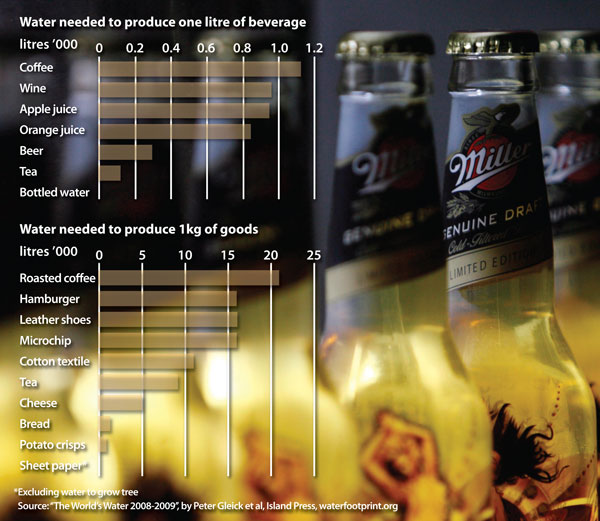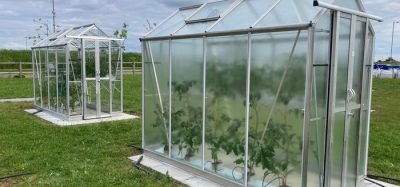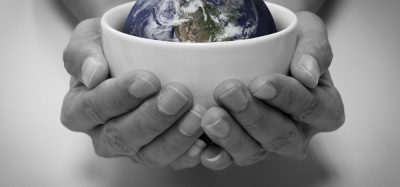Scoring goals for sustainable development
- Like
- Digg
- Del
- Tumblr
- VKontakte
- Buffer
- Love This
- Odnoklassniki
- Meneame
- Blogger
- Amazon
- Yahoo Mail
- Gmail
- AOL
- Newsvine
- HackerNews
- Evernote
- MySpace
- Mail.ru
- Viadeo
- Line
- Comments
- Yummly
- SMS
- Viber
- Telegram
- Subscribe
- Skype
- Facebook Messenger
- Kakao
- LiveJournal
- Yammer
- Edgar
- Fintel
- Mix
- Instapaper
- Copy Link
Posted: 30 June 2010 | Andy Wales, Global Head of Sustainable Development, SABMiller | No comments yet
As one of the world’s largest brewers, with brewing interests and distribution agreements across six continents, SABMiller takes its responsibilities seriously, especially when it comes to sustainable development. In 2009, the company announced its intentions to reduce its fossil fuel emissions on its beers by fifty per cent per litre of beer that they produce. They are also working with WWF on water footprinting to better understand how to manage the resource which is so vital to the business
As one of the world’s largest brewers, with brewing interests and distribution agreements across six continents, SABMiller takes its responsibilities seriously, especially when it comes to sustainable development. In 2009, the company announced its intentions to reduce its fossil fuel emissions on its beers by fifty per cent per litre of beer that they produce. They are also working with WWF on water footprinting to better understand how to manage the resource which is so vital to the business
As one of the world’s largest brewers, with brewing interests and distribution agreements across six continents, SABMiller takes its responsibilities seriously, especially when it comes to sustainable development. In 2009, the company announced its intentions to reduce its fossil fuel emissions on its beers by fifty per cent per litre of beer that they produce. They are also working with WWF on water footprinting to better understand how to manage the resource which is so vital to the business. Not to mention that they’re a sponsor of Bafana Bafana (that’s the South African national football team, to those not in the know) and will also be providing beer at FIFA Fan Fests during the World Cup itself, held this summer in South Africa. Their portfolio includes premium international beers such as Pilsner Urquell, Peroni Nastro Azzurro, Miller Genuine Draft and Grolsch.
“The process of brewing takes on average five litres of water to one litre of beer,” says Andy Wales, SABMiller’s Global Head of Sustainable Development. “SABMiller’s performance is better than average, at 4.5 litres of water to one litre of beer. Our goal is to reduce this by 25 per cent by 2015.”
SABMiller intends to save approximately 20 billion litres of water every year by 2015, which they calculate to be enough water to fill eight thousand Olympic-sized swimming pools. Efficiency is the key, and they aim to set a new industry benchmark, which seems increasingly necessary as water shortages are threatening in just 20 years, according to multiple reports. Water use has grown at more than twice the rate of population over the past century.
“In October 2009, we announced our global partnership with WWF – The Water Futures Partnership,” Wales explains. “This builds on existing best practice undertaken by SABMiller and WWF in Colombia, Honduras and El Salvador and is building a detailed understanding of the risks posed by the predicted water stress in Peru, Tanzania, South Africa and Ukraine, and its impact throughout our value chain.
“Our project in Honduras involves helping farmers to introduce biological controls for pest management. They use a fungus (Metarhizium anisopliae), which attacks the sugar cane pest: the froghopper (Aeneolamia postica). The fungus attacks the froghopper, but is not toxic to humans, animals or the ecosystem as a whole. This eliminates the use of toxic pesticides, saves money and reduces the subsequent run-off into water systems.
“In South Africa, one of the projects with WWF involves tackling water-intensive alien vegetation. Sufficient land is rehabilitated to offset the water consumption of the nearby brewery. In addition to addressing the issue of water scarcity, this project also provides high levels of local employment.”
SABMiller and WWF are working together on water footprinting in an attempt to better understand the resource that is so vital to the beer industry. A water footprint covers the entire value chain, from crops to brewing and distribution. Studying it can help the company to understand where water scarcity or quality may affect the supply chain and enable them to plan now for future challenges.
“The work we have been doing on water is the best demonstration of implementing a value chain approach,” Wales surmises. “We understand and carefully manage the use of water in our own breweries but the vast majority of beer’s water footprint (over 90 per cent) is used in agriculture, to grow the hops and barley which go into making beer.” Footprinting helps to foster understanding of the quantity, efficiency and geographical context of water used in the beer value chain, and helps the company to better manage one of its key resources. As SABMiller operates worldwide, gaining an insight into the differences between geographical regions is important. In South Africa, the total water footprint is equivalent to 155 litres of water per one litre of beer, such as Carling Black Label. Yet in Czech Republic, the overall water footprint is significantly smaller, at 45 litres of water per one litre of beer.


SABMiller’s sustainable development philosophy is not just about philanthropy but rather about how changes in society and the environment will impact on the business both in terms of opportunities and in terms of the challenges they present. “We manage sustainable development by looking at those things which are core to our business and how we can affect them, and we take a value chain approach to opportunities and challenges,” Wales observes. “Our aim is to secure economic benefits for the local communities where we grow raw materials and brew beer and also for our shareholders who benefit from a sustainable business and a return on their investment. Environmental sustainability is also critical, whether in terms of using less water to make more beer or reducing our energy and carbon footprint.”
The strategic focus of SABMiller is founded on four key priorities:
- To create a balanced and attractive global spread of businesses
- To create a portfolio of brands that matches the aspirations and preferences of consumers within each market
- To keep raising the performance of local operations
- To gain maximum value from our global scale
The SABMiller approach to sustainable development complements the overarching business strategy. With its worldwide reach, the company is able to take the lessons learned in one market and share it in another. “Whether it’s transferring our African experience in tackling HIV/AIDS in India and Russia or applying our model for developing entrepreneurs in Latin America, through further cross-company training, engagement with the operations and better software tools, we continue to improve the collaboration and sharing between our operations in different parts of the world,” reveals Wales.
So how does the beer industry compare to other beverage industries in its environmental impact? “When you take into consideration the whole value chain, beer is actually one of the less water-intensive beverages,” replies Wales. Coffee, wine and apple juice all have a water footprint more than three times that of beer.
Much research has been carried out into uses for brewers spent grain. In January 2009, SABMiller announced a partnership with the UK’s Biotechnology and Biological Sciences Research Council (BBSRC) with the aim of creating more renewable energy from the natural wastes of the brewing process. “Because spent grain is available at each of our breweries, the technologies being investigated could be used around the world,” says Wales. “Sustainable bioenergy, based on bio-wastes and non food crops, offers the potential to provide a significant source of clean, low carbon and secure energy and to generate thousands of new ‘green collar’ jobs.”
And what about fossil fuels? “From an energy perspective, we have committed to reduce fossil fuel emissions from our beers by 50 per cent per litre of beer produced by 2020,” notes Wales. “This will be achieved through greater energy efficiency and by utilising renewable energy sources such as brewing by-products and agricultural waste. SABMiller anticipates that this will enable it to contain absolute emissions across its 200 beer brands at their 2008 level by 2020, despite production volume growth.”
SABMiller India has already invested in renewable energy sources, including agricultural waste. In May 2007, the first rice husk boiler was installed as part of the expansion of the Rochees brewery in Rajasthan. The boiler uses agricultural waste, typically rice husk, as fuel. The many benefits include reducing manufacturing and fuel costs (especially as the price of rice husk is relatively stable); reducing the brewery’s dependence on scarce fossil fuels; and generating extra income for local farmers from the sale of the husks. In addition, rice husk ash can be sold on for use as a cement filler, an insulator in steel mills and an input for activated silica extraction. The initiative has been so successful it has been extended to two other breweries in Andhra Pradesh and the new greenfield brewery in Haryana.
SABMiller has adopted a new five R model of water responsibility, developed by SABMiller India, to galvanise global operations. As well as the three traditional R’s, Reduce, Reuse, Recycle, they have added pRotect and Redistribute.
pRotect: influence farmers to ensure responsible water use and understand the watersheds we operate breweries and bottling plants within
Reduce: change attitudes and behaviour to reduce water consumption within our plants
Reuse: collect waste water streams within facilities and re-use appropriately
Recycle: investigate new technologies to recycle water for appropriate use within the plant
Redistribute: provide local communities within clean water through community investment programmes and treat wastewater so it can be used for irrigation or other purposes
In order to maintain worldwide quality standards at SABMiller, the company has formally reported their performance on sustainable development at group level for more than 10 years. Their data gathering and reporting processes are aimed at delivering sufficient information to report comprehensively, without imposing an excessive burden on the operations. On the corporate website (www.sabmiller.com), SABMiller’s SAM reporting portal lets visitors see how the group and its subsidiaries have performed against their 10 sustainable development priorities, which are:
- Discouraging irresponsible drinking
- Making more beer, using less water
- Reducing energy and carbon footprint
- Packaging, reuse and recycling
- Working towards zero-waste operations
- Encouraging enterprise development
- Benefitting communities
- Contributing to the reduction of HIV/AIDS
- Respecting human rights
- Transparency and ethics in reporting progress
The company has assessment criteria for each of their priorities. These relate to key issues that they need to manage for each priority. They evaluate their performance on an ascending scale from level one (minimum standard) to level four (best practice).
With all these good intentions and practices, the consumer remains the most important authority on SABMiller’s products. And with their strong performance over the past year, despite the current economy,it looks as though SABMiller is on to a winner.
SABMiller plc
SABMiller plc is one of the world’s largest brewers with brewing interests and distribution agreements across six continents. The group’s wide portfolio of brands includes premium international beers such as Grolsch, Miller Genuine Draft, Peroni Nastro Azzurro and Pilsner Urquell, as well as market-leading local brands such as Aguila, Castle, Miller Lite, Snow and Tyskie. SABMiller is also one of the largest bottlers of Coca-Cola products in the world.







